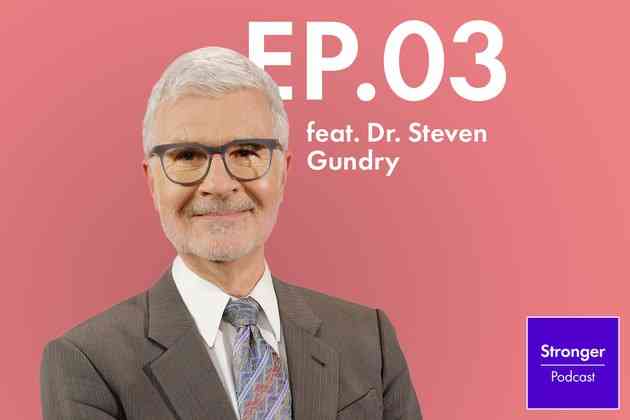Your Brain on Intermittent Fasting with Dr. Steven Gundry

Intermittent fasting, consuming meals within a strict window of time, is quickly becoming a popular topic of discussion.
 What affect does intermittent fasting have on your brain and cognitive function? (Image: Getty Images)
What affect does intermittent fasting have on your brain and cognitive function? (Image: Getty Images) But what does intermittent fasting mean to you? Is it a restrictive and unsustainable diet, or is it a sensible and healthy way to eat? Can it be maintained long term? What are the benefits and risks of fasting and what effect does it have on your body and your brain? Does it necessarily help with weight loss?
On this week's episode of the Stronger podcast, we are joined by Dr. Steven Gundry, bestselling author of The Plant Paradox and a long-time practitioner of intermittent fasting. Dr. Gundry explains his specific way of following an intermittent fasting lifestyle, and makes it clear there isn't a one-size-fits-all method.
For example, Dr. Gundry allows wine as part of his diet - and even adapts his way of intermittent fasting for weekends and special occasions. Dr. Gundry, a preeminent heart surgeon, also goes into how important what you eat is within the parameters of the diet - including the relationship between the keto diet and intermittent fasting, and why the two often go hand-in-hand.
To hear more from Dr. Gundry, listen to the Dr. Gundry Podcast on iTunes.
Curious about trying intermittent fasting yourself? Listen to Your Brain On Starvation Mode to hear what Dr. Gundry has to say - and visit Thrive Market for all your organic food needs!
You can also read some of the highlights from our interview with Dr. Gundry about what intermittent fasting does to our brains, below.
What is Intermittent Fasting?
Intermittent fasting is lengthening the time between one meal and the next meal. I think the longer you can go between meals, eventually, the better it is for you. Intermittent fasting means that you are probably going to eat at least one meal a day, maybe two.
Fasting is - or what most people would define it as - at least 24 hours without eating and usually longer than 24 hours. Time-restricted eating is virtually the same thing as intermittent fasting. You are going to eat all of your calories, in a set period of hours, during the day.
How Does Intermittent Fasting Work In Terms of Weight Loss?
There was a new study published that looked at intermittent fasting and people with type 2 diabetes. The results of the study showed about a 15 pound weight loss in about a three-month time period.
If you are restricting the time you are going to eat food, you are going to restrict calories because it's virtually impossible to cram a lot of calories into a small amount of time. So it's an easy way to actually practice calorie restriction. That's how I use it, personally.
 Dr. Steven Gundry joins LIVESTRONG.com's Stronger podcast to talk about intermittent fasting. (Image: livestrong)
Dr. Steven Gundry joins LIVESTRONG.com's Stronger podcast to talk about intermittent fasting. (Image: livestrong) How Do You Follow Intermittent Fasting?
For the last 11 years, between January and June, Monday through Friday, I eat all my calories in a two-hour window of time (between 6pm and 8pm). So for 22 out of 24 hours I'm fasting, and then for two hours I'm eating. During those months, I usually lose around 10 to 15 pounds.
One of the reasons I do it is not to be some cultist, but my research in human evolution suggests, along with others, that during the summer and fall, we would eat a lot to store fat for a period in which we consume less food, which was the winter. During the winter, we wouldn't eat as much, and we'd use up the fat that we'd acquired.
On a more fundamental level, we operate on circadian rhythms, both a 24-hour clock but also a seasonal clock. I wrote in my next book, The Longevity Paradox, that there should be a time of a growth cycle every year (which is usually the summer or the fall) and then there should be a time of regression.
We want to create a period of apoptosis where our body cleans all these marginal cells out. Looking at primitive tribes, and at gorillas and chimps, that's what all of these animals and humans do: Growth and then regression. With us, we're really in 365 days a year of growth. We never go through this part of regression like we should. I think, in large part, one of the reasons we have such fascinating high cancer rates is because we never really prune the tree. We are always growing.
What Does Intermittent Fasting Do For Your Brain and Your Cognitive Function?
Neurons can use two fuels. They can use glucose, which is what they use most of the time, but they can also use ketones. But interestingly enough, the orgenelles (12:55) that power energy production in all of our cells are mitochondria. Mitochondria are actually bacteria, that millions and millions of years ago, were engulfed by cells and all eukaryotes (13:13) (which is us), use these bacteria. Mitochondria make and generate ATP, among other things using glucose in the Krebs cycle, but what's fascinating is that ketones are a form of fat that can produce energy in mitochondria with a lot less work by the mitochondria.
It appears that mitochondria can produce the same amount of energy with about 50-percent of the calorie content in a ketone as compared to glucose. And they can do it with much less oxygen utilization. There's are a lot of us who think that dementia or memory loss is, in part, a failure of mitochondria to efficiently use fuel.
Also, it turns out that mitochondria can divide and duplicate separate from the DNA in the nucleus of the cell. Mitochondria have their own DNA that's actually bacterial DNA. What's fascinating is that you can build more mitochondria within the cell without the cell having to divide. What that means, in terms of intermittent fasting, is if you sense that fuel is not available or fuel is in tough supply, then you can stimulate mitochondrial fission. In other words, mitochondrial division (making more of them) to turbocharge the cellular engine.
The best way I know to look at this is when we had fuel economy standards put into place. Yes, you can have a V8 engine that was draining gas as soon as you pump it into the tank and produce, let's say, 300 horsepower. Because of fuel economy standards and with engineering, you can now take a four-cylinder engine and put in a turbocharger and still make 300 horsepower but with a lot less gas.
Getting back to the brain, if you supercharge your mitochondria by restricting the calories during a period of time, it sends a signal to mitochondria to extract more energy from less resources. You basically turbocharge each one of the cells in your brain to become far more efficient at using fuel. It's a really cool concept, and it works.
To learn more about what intermittent fasting does to your brain, listen to the whole episode here.




